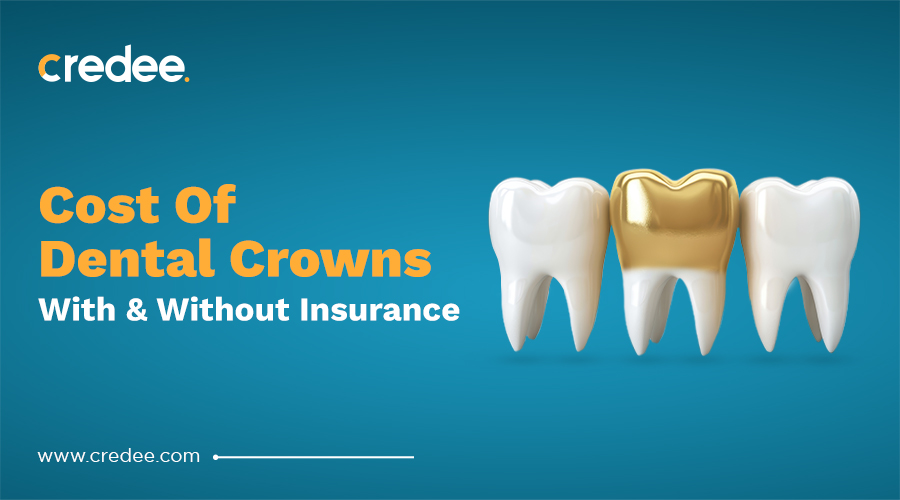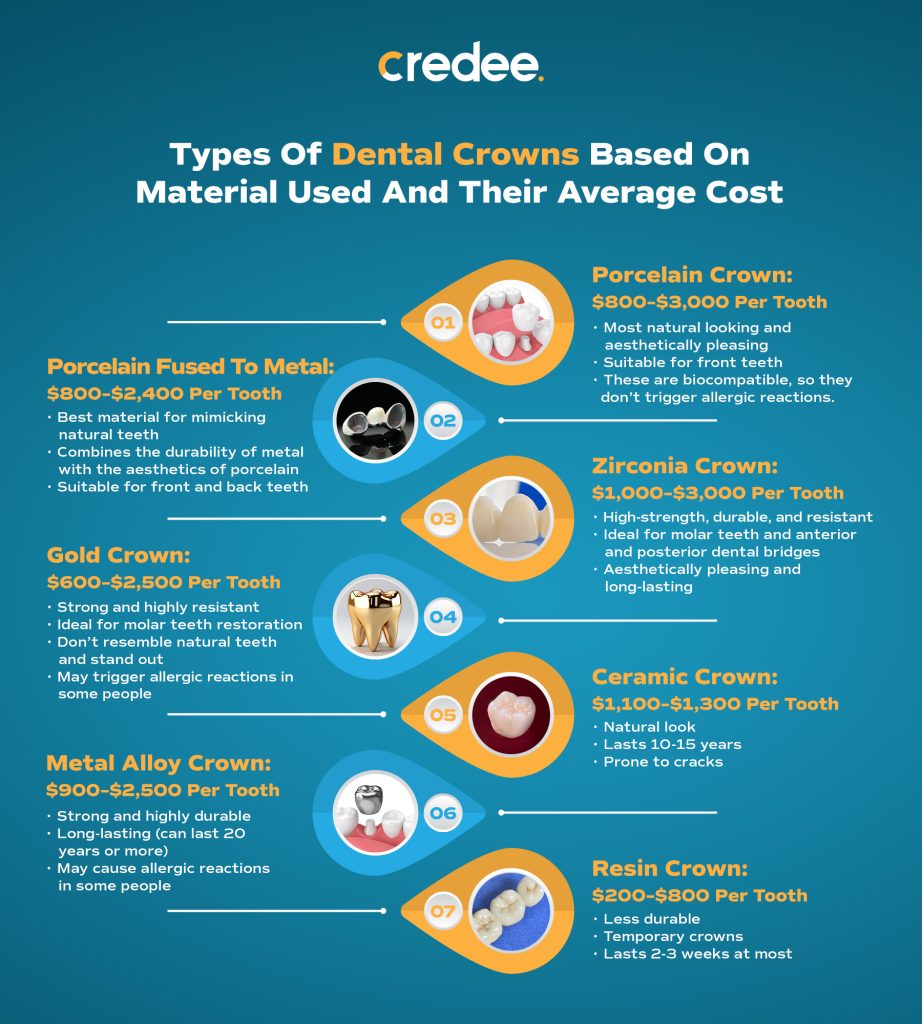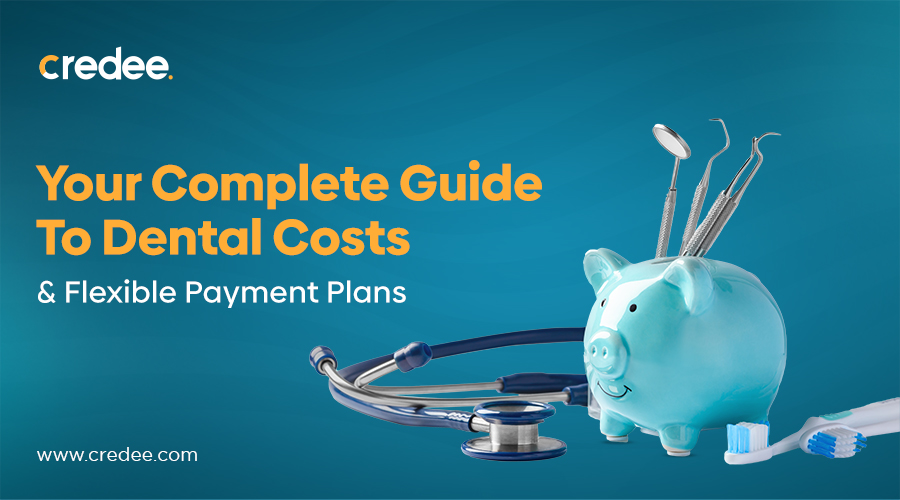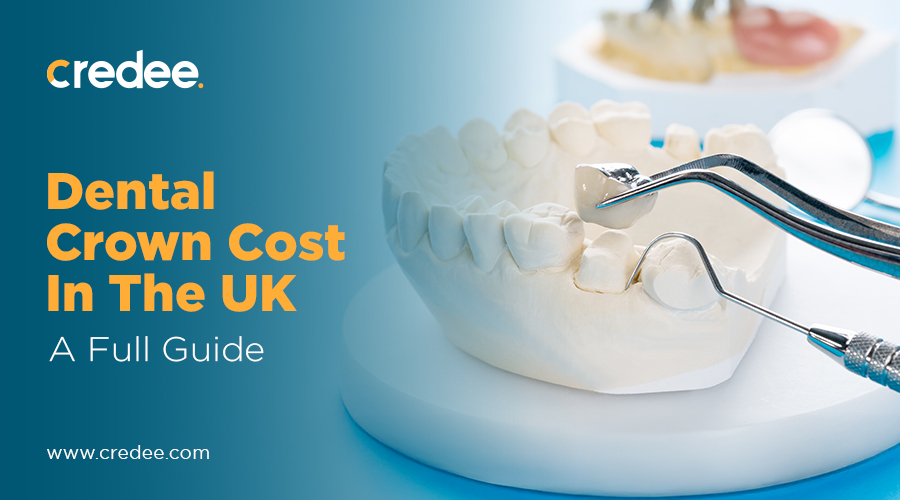
Dental crowns are an excellent way to cover the teeth imperfections and restore a decayed tooth. On average, dental crowns cost $500–$1500 with insurance. However, if you don’t have dental insurance, your first thought might be, “How much is a crown without insurance?”. It is a top concern for many, as dental crowns can cost $1,000–$3,000 per tooth without insurance. This can feel pretty expensive, especially when you have to pay upfront. But, that’s just the average cost of a crown, whereas the actual cost varies based on various factors, including associated costs.
In this blog, we’ll discuss all about dental crowns, including the different types of dental crowns, their costs, the factors that affect the cost, and financing options that help ease the financial burden.
What Are Dental Crowns?
It’s a dental cap that is installed on a severely decayed or damaged tooth. The crown can be designed in the exact shape and appearance of existing teeth using materials like zirconia, metal, porcelain, or composite materials. This not only rejuvenates your smile but also protects the damaged tooth, making the tooth structure stronger.
This treatment method is ideal for a range of issues, such as:
- To fix a chipped or cracked tooth
- After a complex root canal procedure
- To prevent further decay
- To protect a weaker tooth
- For covering a stained or abnormally shaped tooth
- Sometimes used for dental bridges
Understand the costs of dental bridges and find out how to pay without insurance.
Diagnostic Costs Explained: Why Do Dental Crowns Cost So Much?
The average cost of dental crowns ranges from $500 to $3,000 per tooth. However, there are also other associated expenses, which can drive up the cost. Below are the costs you can expect when considering getting a dental crown.
| Particulars | Average Cost |
|---|---|
| Dental Consultation | $50–$350 Per Visit |
| Diagnostic X-ray | $40–$250 |
| Root Canal (If needed) | $250–$2,000 |
| Temporary Crown (If needed) | $200–$450 |
| Dental Crown (With Insurance) | $500–$1,500 Per Tooth |
| Dental Crown (Without Insurance) | $1,000–$3,000 Per Tooth |
What Are The Different Types Of Dental Crowns And How Much They Cost?
The cost is determined based on the materials used for crafting the dental crown. Additionally, the cost varies based on its usage. Therefore, these can be divided into two categories.

1. Types Of Dental Crowns Based On Material:
| Type Of Crown | Estimated Cost Range (Per Tooth) | Average Cost (Per Tooth) |
|---|---|---|
| Gold Dental Crowns | $600–$2,500 | $1,230 |
| Zirconia Crowns | $1,000–$3,000 | $1,300 |
| Metal/Titanium Crowns | $900–$2,500 | $1,300 |
| Ceramic Crowns | $1,100–$1,300 | $1,200 |
| All Porcelain Crowns | $800–$3,000 | $1,430 |
| Porcelain-Fused-To-Metal | $800–$2,400 | $1,100 |
| Resin Crowns | $200–$800 | $450 |
2. Types Of Dental Crowns Based On Use:
Temporary Crowns — These are made of acrylic resin or acrylic-based metals. These stay in your mouth for 1–2 weeks and are removed to fix the permanent crown.
Traditional Crowns — These are designed to cover the abutment by removing the damaged part of the tooth and replacing the tooth. For this, the dentist takes an impression of the teeth and uses common materials such as porcelain or zirconia to craft the crown for tooth restoration.
Onlays — These are designed to cover only part of the damaged tooth, i.e., one-third of the portion at most. It is the least invasive and preserves the natural tooth as much as possible.
The type of dental crown you need depends on the condition of your tooth that requires restoration.
What Affects Dental Crown Cost?
The following factors can affect the dental crown cost:
- The location where you get the procedure
- The type of material used for the crown
- The location of the mouth where the dental crown needs to be installed, i.e., molar teeth, pre-molar teeth, bicuspids, incisors, or canines. For instance, molar teeth crowns are typically less expensive than crowns for front teeth.
- If any additional dental work is required (such as dental implants or dental bridges)
Here is a list of the average dental crown cost based on geographical location:
| State | Average Cost Of Dental Crowns (per tooth) |
| Alabama | $800–$2,500 |
| Arizona | $700–$2,200 |
| Arkansas | $536–$3,500 |
| California | $800–$3,000 |
| Colorado | $500–$3,000 |
| Connecticut | $1,200–$3,000 |
| Delaware | $680–$1,100+ |
| Florida | $800–$1,500 |
| Georgia | $800–$1,500 |
| Hawaii | $900–$1,300 |
| Idaho | $800–$1,500 |
| Illinois | $500–$2,500 |
| Indiana | $500–$2,500 |
| Iowa | $750–$3,500 |
| Kansas | $500–$2,000 |
| Kentucky | $525–$1,500 |
| Louisiana | $550–$1,700 |
| Maryland | $500–$2,500 |
| Massachusetts | $1,400–$2,000 |
| Maine | $750–$3,000 |
| Michigan | $600–$2,500 |
| Minnesota | $1,000–$2,500 |
| Mississippi | $590–$2,500 |
| Missouri | $600–$2,000 |
| Montana | $615–$2,000 |
| Nebraska | $600–$1,500 |
| Nevada | $500–$3,000 |
| New Hampshire | $500–$1,575 |
| New Jersey | $800–$2,500 |
| New Mexico | $500–$1,500 |
| New York | $800–$1,700 |
| North Carolina | $800–$3,000 |
| North Dakota | $500–$1,400 |
| Ohio | $500–$1,500 |
| Oklahoma | $1,100–$2,200 |
| Oregon | $800–$1,700 |
| Pennsylvania | $500–$2,500 |
| Rhode Island | $715–$1,200 |
| South Carolina | $700–$1,300 |
| Tennessee | $1,000–$1,500 |
| Texas | $500–$3,000 |
| Utah | $600–$1,200 |
| Vermont | $700–$1,800+ |
| Virginia | $500–$2,000 |
| Washington State | $800–$2,200 |
| Washington, D.C. | $800–$2,500 |
| West Virginia | $700–$2,500 |
| Wisconsin | $1,200–$2,000 |
| Alaska | $900–$1,850 |
These costs do not include the other associated costs, as each patient has different treatment needs. Thus, the actual cost can be much higher. It is recommended to consult with your local dentist to get an accurate estimate. Additionally, it is best to discuss your payment options upfront so you can plan your finances accordingly.
Which Types Of Dental Plans Cover Crowns?
1. DHMO Plans
Dental Health Maintenance Organization (DHMO) plans enable patients to get coverage for a range of basic and major dental treatments from a designated primary care dentist (PCD). The cost is shared by the patient and the provider as per the specifics of the plan.
For instance, depending on the coverage, the DHMO insurance may cover the partial cost, say 60%, and the 40% will be covered by the patient. However, there will be no coverage if the patient gets treatment from an out-of-network dentist. In that case, the patient will be liable for paying the whole amount.
2. PPO Plans
Preferred Provider Organization (PPO) plans allow patients to get treatments such as a dental crown fixture at lower prices from the specified network of dentists. However, this plan also gives the patients the flexibility to choose their preferred provider, unlike DHMO plans. So, if you choose an out-of-network provider, there may be partial coverage for a specified amount, and the patients will need to cover the difference.
3. Financing Options
For patients who do not have dental coverage, dental financing is a popular option. This allows you to get the required treatment without delay. For this, you may need to discuss with your dental care provider and learn the eligibility criteria. In most cases, patients usually need to go through a credit check and should have a 620 credit score or higher to qualify for financing.
4. Easy Payment Plans—No Credit Check
If you aren’t able to pay the upfront amount or qualify for traditional financing, many dental clinics also offer flexible dental payment plans using platforms like Credee. These are aimed at providing easier access to needed dental services to patients with no credit check financing, regardless of their credit scores.
This means you won’t need to go through an extensive credit check or a long application process, as you can get approved instantly and choose a repayment plan that best fits your budget. Hence, this alleviates the financial burden significantly. So, simply ask your provider if they provide no-credit-check financing with Credee or any other platforms.
Dental Payment Plans: What Dentists Offer & How They Benefit
Final Thoughts
Dental crowns are ideal for restoring and protecting damaged, cracked, broken, or decayed teeth. However, paying the cost all at once may not be feasible for everyone. In that case, there are various financing options available for patients, including traditional financing as well as no-credit-check options like Credee. So, make sure to discuss your payment preferences with your provider to manage the costs effectively.
FAQs
A. What Are The Different Types Of Dental Crowns?
These can be divided into two categories.
1. The types of dental crowns based on the material:
- Porcelain crowns
- Porcelain-fused-to-metal dental crowns
- Metal crowns
- Zirconia crowns
- Composite dental crowns
- Gold crowns
- Stainless steel crowns
2. Types of dental crowns based on use:
- Temporary Crowns
- Traditional Crowns
- Onlays
B. How Much Do Dental Crowns Cost?
Dental crown prices start from $500 for the cheapest dental crown. A high-quality crown may cost up to $3000 or more per tooth. However, on average most people spend $1000–$1500 on dental crowns (per crown).
C. How Much Is The Crown Per Tooth Cost?
The average cost with insurance can be $500–$1,500 per tooth and $1,000–$3,000 without insurance.
D. What Is The Dental Crown Cost When Going To An In-Network Vs. Out-Of-Network Dentist?
Going to an in-network dentist is cheaper than an out-of-network dentist if you have a PPO plan. This means if the treatment costs, say $1,500; the insurance may cover a specified amount, i.e., $1,000 (as per the plan) while you may need to pay $500 if you visit an in-network dentist. However, if you choose an out-of-network dentist, you may need to incur additional expenses. So, from an out-of-network provider, the treatment may cost, say $1,700. In that case, the plan may provide partial coverage till the specified amount, i.e., $1000 and the rest will need to be covered by the patient.
E. Are Molar Crowns More Affordable Than Front Teeth Crowns?
Yes. Since the molar crowns are installed in the back of the mouth, they need to be functional, while aesthetics can be ignored. However, for front teeth, it's crucial to consider their appearance, and aesthetically pleasing materials are comparatively more expensive. Hence, front teeth crowns are more expensive than molar teeth crowns.
F. What Materials Are Used In Dental Crowns?
Dental crowns are made from the following materials:
- Porcelain
- Ceramic
- Zirconia
- Gold
- Metal
- Titanium
- Acrylic Resin (for temporary crowns)
- Composite Materials (i.e. porcelain fused to metal)
G. How Much Root Canal And Crown Cost (Without Insurance)?
Root canal cost averages $600–$2000+ per tooth. On the other hand, a dental crown generally costs around $500–$1500 to over $3000, depending on the material used. Thus, the combined estimated treatment cost of a root canal with a dental crown is around $1,300–$4,500.
H. What Is The Cheapest Crown For A Tooth?
A resin crown can be the cheapest option, and it’s also the least durable. So, It's used as a temporary crown as the dentist prepares the permanent one. This type of crown lasts 1 week to 3 weeks at most.
I. Which Crown Is Most Expensive?
A zirconia crown and porcelain dental crown are the most expensive and for good reason. They give an indistinguishable natural look and are also the most durable.
Take Action Now For A Healthier, Happier Smile—Don't Wait!
Schedule A Demo



